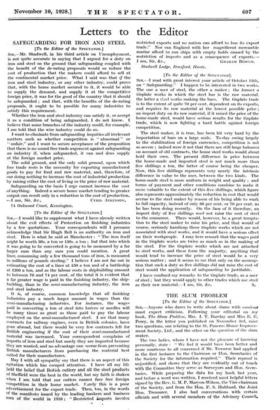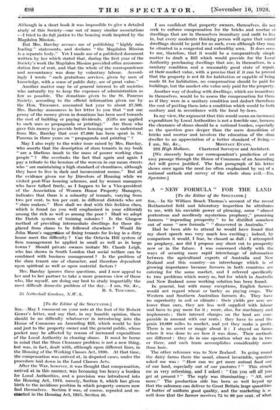THE SLUM PROBLEM
[To the Editor of the SPECTATOR.] Sin,—Anyone who dares to write about slums with candour must expect criticism. Following your editorial on my book, The Slum Problem, Mrs. I. T. Barclay and Miss FL E. Perry, in the letter you published on November 3rd, raise two questions, one relating to the St. Pancras House Improve- ment Society, Ltd., and the other on the question of the slum maker.
The two ladies, whom I have not the pleasure of knowing personally, state "We feel it would have been better and more courteous to all concerned if Mr. Townroe had applied in the first instance to the Chairman or Hon. Secretaries of the Society for the information required." Their reproof is unjustified, and shows that they are evidently out of touch with the Committee they serve as Surveyors and Hon. Secre- taries. While preparing the data for my book last year, and before a word was written, I received most helpful letters signed by the Rev. G. M. P. Maryon-Wilson, the Vice-chairman of the Society, and from the Hon. F. S. Hubbard, the Joint Hon. Treasurer. I also had conversations with certain officials and with several members of the Advisory Council■
Although in a short book it was impossible „to give a detailed study of this Society—one out of many similar associations —I tried to do full justice to the housing work inspired by the Magdalen Mission.
• But Mrs. Barclay accuses me of publishing "highly mis.. leading" statements, and declares "the Magdalen Mission is a separate body." Yet I made use of a published document written by her which stated that, during the first year of the Society's work the Magdalen Mission provided office accommo-
dation free of rent, and that the whole of the correspondence and accountancy was done by voluntary labour. Accord- ingly I wrote "such gratuitous services, given by men of• knowledge, with a sense of public duty, are of great value." _Another matter may be of general interest to all societies who naturally try to keep the expenses of administration as low as possible. The donations given to the St. Pancras S6Ciety, according to the official information given me by the Hon. Treasurer, amounted last year to about £7,500. Mrs. Barclay announces in her letter to you that "not one penny of the money given in donations has been used towards the cost of building or paying dividends. (Gifts are applied to such uses as propaganda or printing)." Are those who gave this money to provide better housing now to understand from Mrs. Barclay that over £7,000 has been spent in St. Pancras in three years on "propaganda and printing " ?
May I also reply to the wider issue raised by Mrs. Barclay, who asserts that the description of slum tenants in my book "are a libelous insult to the mass of poorer working class people " ? She overlooks the fact that again and again I pay a tribute to the heroism of the women in our mean streets who" are maintaining a high standard of cleanliness, although they have to live in dark and inconvenient rooms." But all the evidence given me by Directors of Housing while we visited post-War housing schemes, and by women managers who have talked freely, as I happen to be a Vice-president of the Association of Women House Property Managers, indicates that there is a minority of tenants, varying from two per cent, to ten per cent. in different districts who are "-slum makers." How shall we deal with this feckless class, which is found (as you well emphasized in your editorial) among the rich as well as among the poor ? Shall we adopt the Dutch system of training colonies ? Is the Glasgow method of providing intermediate dwellings for those dis- placed from shuns to be followed elsewhere ? Would Sir John Mann's suggestion of fining tenants for living in a dirty house meet the difficulty ? Can the Octavia Hill system of firm management be applied in small as well as in large towns ? Should private owners imitate Mr. Claude Leigh, who has shown in South London that social welfare can be combined with business management ? Is the problem of the slum tenant one of character, and therefore dependent upon spiritual as well as upon material factors ?
Mrs. Barclay ignores these questions, and I now appeal to her and to her partner to take a more generous view of those who, like myself, are doing our best to study impartially the most difficult domestic problem of the day.—I am, Sir, &c., B. S. TOWNROE. 53 Netherhall-Gardens, N.W. 3.













































 Previous page
Previous page